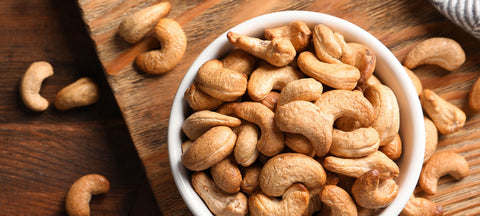When it comes to discussing healthy eating, we often focus on fruits, vegetables, and whole grains, but there's an unsung hero that deserves attention: cashews. These kidney-shaped nuts, originating from the tropics, are not only delicious but also packed with numerous health benefits.
Rich in Essential Nutrients
Cashews are a powerhouse of essential nutrients. They contain a good amount of protein, healthy fats, fiber, vitamins, and minerals, making them a valuable addition to any diet. A one-ounce serving of cashews provides approximately 5 grams of protein, along with a variety of amino acids necessary for building and repairing tissues.
Heart Health and Cholesterol Control
Contrary to popular belief, cashews are an excellent source of healthy fats. They are abundant in monounsaturated and polyunsaturated fats, which have been linked to improved heart health. Regular consumption of cashews has been associated with reducing the risk of cardiovascular diseases by lowering LDL (bad) cholesterol levels and increasing HDL (good) cholesterol levels.
Weight Management and Satiety
Including cashews in your diet can support weight management efforts. Despite being energy-dense, cashews can help control appetite and promote feelings of satiety. The combination of protein, fiber, and healthy fats in cashews helps slow down digestion, keeping you feeling fuller for longer and reducing the likelihood of overeating.
Brain Health and Cognitive Function
Cashews contain several nutrients that support brain health and cognitive function. They are a rich source of magnesium, which plays a crucial role in maintaining brain health, improving memory, and enhancing learning abilities. Additionally, cashews provide vitamin E, an antioxidant that may help protect the brain from oxidative stress and age-related cognitive decline.
Bone Health and Strength
Cashews are a good source of essential minerals like calcium, magnesium, and phosphorus, all of which are crucial for maintaining strong and healthy bones. These minerals work together to support bone density and prevent conditions like osteoporosis. Regular intake of cashews can contribute to maintaining optimal bone health, especially in individuals at risk of bone-related issues.
Promoting Healthy Skin and Hair
The nutrients found in cashews, including copper, zinc, and vitamin E, play a vital role in promoting healthy skin and hair. Copper aids in the production of collagen and elastin, which are essential for maintaining the elasticity and structure of the skin. Zinc supports the growth and repair of tissues, including hair follicles, while vitamin E acts as a powerful antioxidant that helps protect the skin and hair from damage caused by free radicals.
Incorporating Cashews Into Your Diet
Adding cashews to your diet is simple and versatile. They can be enjoyed as a snack on their own, sprinkled over salads, blended into smoothies, or used as a base for creamy sauces and dressings. However, it's important to consume them in moderation, as they are calorie-dense. A handful of cashews or a quarter-cup serving is generally a recommended portion size.
Cashews are not just tasty, but they offer an array of health benefits that make them an integral part of a balanced diet. From providing essential nutrients and promoting heart health to supporting brain function and maintaining strong bones, these nuts have a lot to offer. So, go ahead and embrace the humble cashew, and let it be a delicious and nutritious addition to your daily meals, helping you achieve optimal health and well-being.



